ESE Alumni Profiles
| First & Last Name | Mentor/Lab | Home Department(s) | |
|---|---|---|---|
| Caitlin Grady | Ernest R. Blatchley III | Civil Engineering |
Caitlin GradyHome Department:Civil Engineering Mentor / Lab:Ernest R. Blatchley III Specific Research Area / Project:Post implementation research on non-profit water treatment and watershed management interventions in developing countries. Lab / Personal work-related websites:Current Research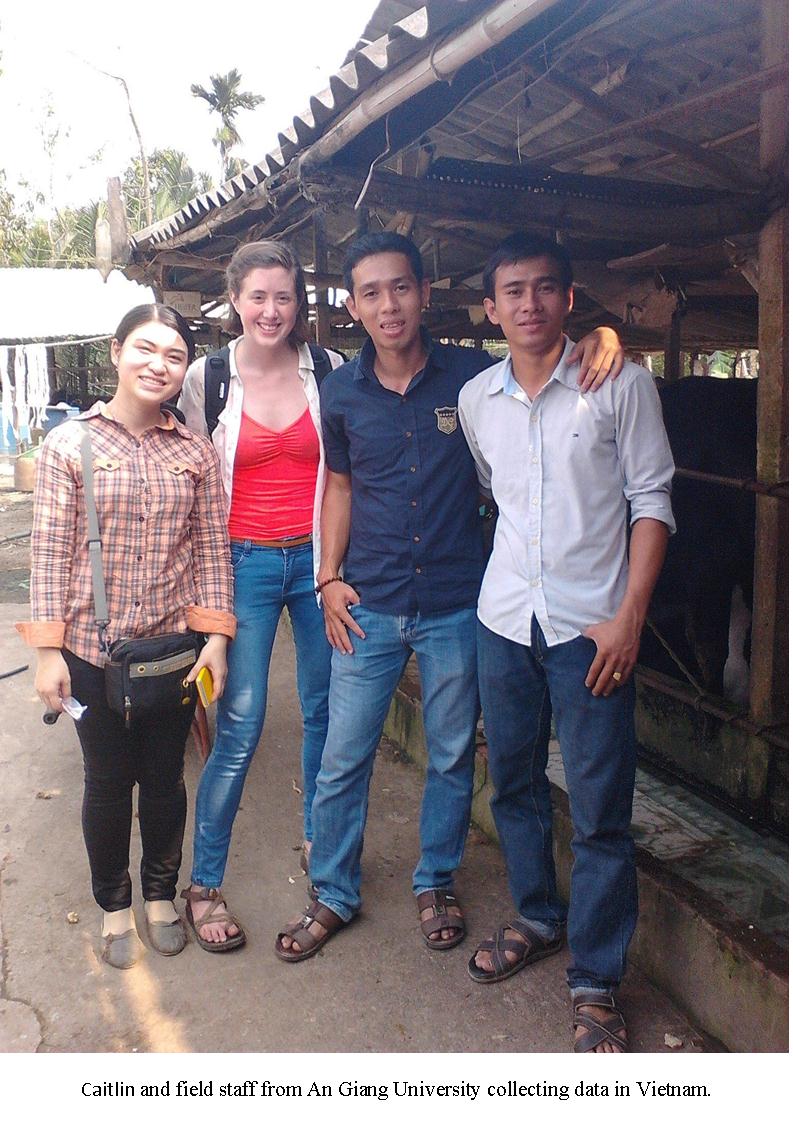 About MeIt is not very common for an engineer to have political ambitions. Since I was in middle school however, policy and politics are all I’ve wanted to do. As my interest in international policy grew throughout high school and college, so did my interest in water resources. Water is such an important part of everyone’s lives, and is the cause of both conflict and cooperation locally, regionally and globally. In college I was guided by a wonderful advisor who encouraged me to continue technical training in graduate school in order to bring a scientific perspective and understanding into policy in my future profession. At Purdue, the ESE program has allowed me to work on interdisciplinary projects that will prepare me for my future work in policy. Awards:
Publications:
Presentations:
Leadership:
|
| Dan Newkirk | Bill Hutzel | Mechanical Engineering |
Dan NewkirkHome Department:Mechanical Engineering Mentor / Lab:Bill Hutzel Specific Research Area / Project:Biofiltration in an Energy Efficient, Residential, HVAC System 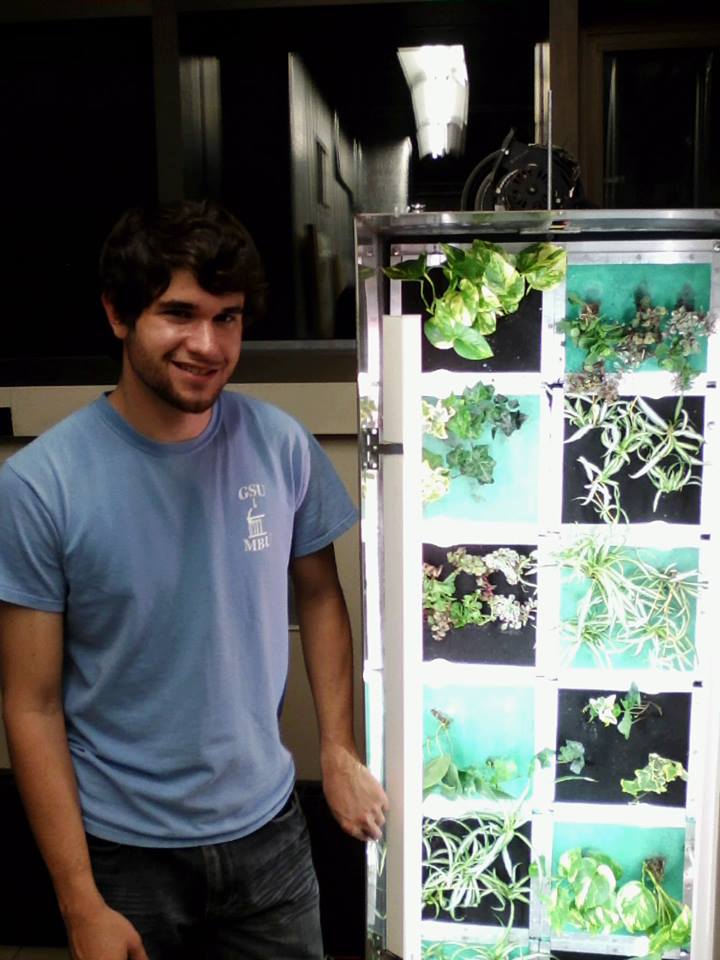 About MePerhaps not unlike other undergraduates in mechanical engineering, I made the mistake of going in to the discipline because I was “good at math and science” and I wanted to keep my options open. However, I quickly learned the traditional mechanical engineering jobs (design and manufacturing valves, gears, machines, etc.) did not interest me; I could not see their broader impacts. It was not until the summer after my sophomore year I realized my interest in thermodynamics and pursued this interest by conducting energy audits for the Iowa DNR as a Pollution Prevention Intern. This is where I found my passion, using my analytical mindset to help the environment and further society. I decided to further my education in the field by coming to Purdue, joining the ESE program to better understand global problems, working part-time at Purdue Facilities to apply my current skillset and developing technological solutions through my research. Awards:
Leadership:
|
| Fushcia-Ann Hoover | Laura Bowling | Agricultural & Biological Engineering |
Fushcia-Ann HooverHome Department:Agricultural & Biological Engineering Mentor / Lab:Laura Bowling Specific Research Area / Project:Urban Stormwater Management 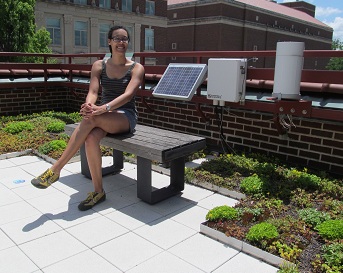 About MeWhile my experience at Purdue has been challenging at times, my time in the ESE program has been nothing but positive. My advisor, Dr. Lee and ESE peers truly make me feel supported and valued as a researcher and as a contributing individual to the program. I am fortunate enough to share an office with 5 other ESE students at various stages of their master’s and doctoral studies. In this office, we have weekly and oftentimes daily discussions on things from how to prepare for prelims or a defense or insights on courses to ideas for research methods and proposals. We talk about personal struggles and successes and generally provide a very inclusive environment where anyone can talk freely. This is one of the biggest aspects I appreciate about the program and its members. Asking questions is always okay and there are always people to help you along the way so despite the fact that everyone has their own research, goals and advisors, you never have to navigate the graduate school process alone because we all want to see each other succeed. Awards:
Publications:
Presentations:
Leadership:
|
| Helena Avila-Arias | Ron Turco and Larry Nies | Agronomy |
Helena Avila-AriasHome Department:Agronomy Mentor / Lab:Ron Turco and Larry Nies Specific Research Area / Project:Soil Microbial Community Response to Metal Oxide Engineered Nanomaterials Involved in Energy Storage Technologies 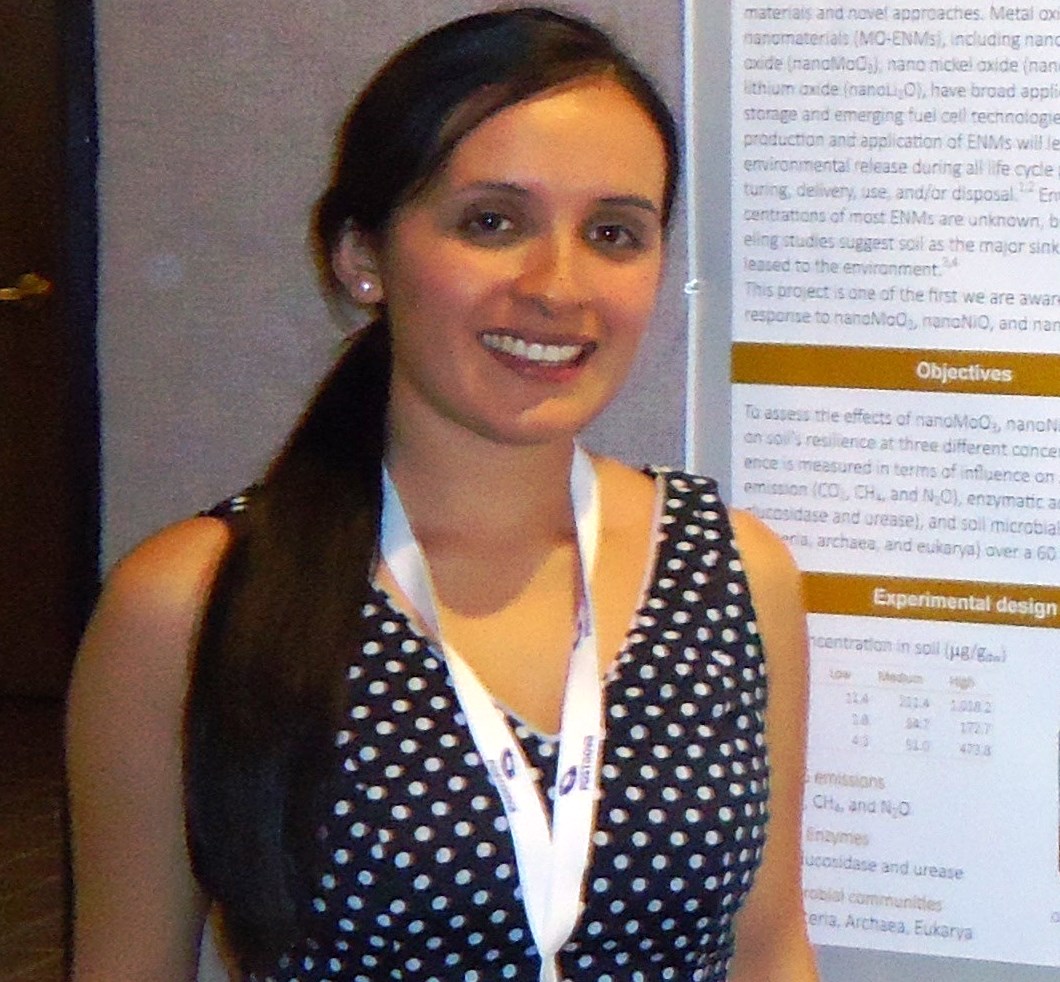 About MeI decided to jump into this Ph.D. journey primarily because I love research and was 100% convinced that I wanted to be a professor. My passion for research is intact. The discovery process from identifying a gap of knowledge through analyzing the ‘weirdness’ of the results is just fascinating! My passion for teaching is present as well. I believe we are all students and teachers every day, not only within an academic institution. Inspiring and being inspired is a daily experience! Meeting people in the name of science (including traveling!) is one exciting part of being a scientist in which I very much enjoy! Interacting and sharing experiences with researchers within and outside your field is so enriching; seeing the same topic through different lenses is an awing experience! ESE has allowed me to do exactly that; it has helped open my mind (and ears) to interdisciplinary approaches across many topics. We are a community that looks forward to solving problems and improving situations. Sharing with eyes from different backgrounds has been absolutely beneficial to my growth and success thus far. Awards:
Publications:
Presentations:
Leadership:
|
| Meghan Moser | James Camberato | Agronomy |
Meghan MoserHome Department:Agronomy Mentor / Lab:James Camberato Specific Research Area / Project:Residual effects of inorganic nitrogen fertilization on soil nitrogen pools and corn growth. 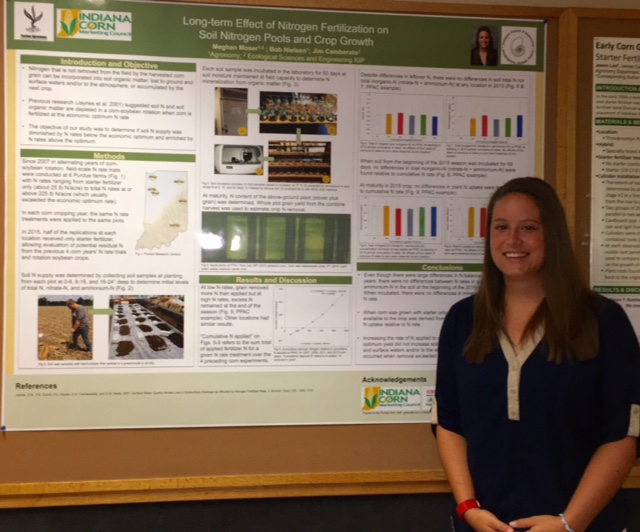 About Me“Do not go where the path may lead, go instead where there is no path and leave a trail.”-Ralph Waldo Emerson. As a young scientist, my work embraces this statement to make new discoveries for both the environment and the agriculture industry. Since I was born and raised on a farm, I grew up believing that my “path” would lead me to continue the farming tradition. However, a soil science research position at Ohio State shifted my career goals in a new direction. I soon discovered the exciting field of research, a constantly changing and challenging field, but one that would quickly become my passion. Following graduation from Ohio State, I realized I wanted more and felt that I had a lot to offer to research, the environment, and to agriculture. I soon came across and was admitted to Purdue’s Ecological Science and Engineering Interdisciplinary Graduate Program (ESE-IGP). I felt that my background in agriculture and my degree from Ohio State in Environmental Science would bring ESE an insightful and balanced viewpoint of environmental issues. Thus far, my time in graduate school has taught me a range of skills; I value the importance of communication, attention to detail in the lab and field, patience when teaching, and most of all, the connections and people I have met along the way. Upon completion of my thesis in December 2016, I will set out on a new path. I aspire to leave new trails towards soil conservation and management. I thank everyone who has impacted my path so far and am excited to see what the future holds. Presentations:
Leadership:
|
| Natalie Chin | Keith A. Cherkauer | Agricultural & Biological Engineering |
Natalie ChinHome Department:Agricultural & Biological Engineering Mentor / Lab:Keith A. Cherkauer Specific Research Area / Project:The Potential Impacts of Extreme Weather Events on the Great Lakes: Environmental and Socioeconomic Vulnerability, Adaptive Capacity, and the Creation of Usable Science 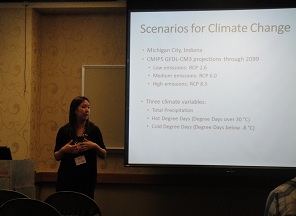 About MeBefore coming back to school full-time to pursue my PhD, I worked for about four years in Washington, D.C., for several science and environmental policy organizations. It was through this setting that I came to more fully appreciate the importance of people who can communicate across disciplines and the many ways that science and society interact. It was my hope, in pursuing further education, that I would be able to develop the skills and expertise needed to work across disciplines on important environmental issues. I feel incredibly fortunate to be a part of the ESE program because it allows me to pursue these aspirations while conducting research that builds on my engineering and policy backgrounds. Awards:
Publications:
Presentations:
Leadership:
|
- Student Profiles
- ESE Student Profiles
- ESE Alumni Profiles


